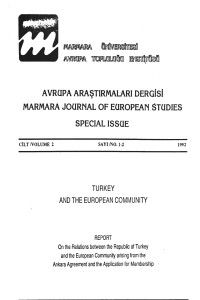Öz
The abolition of customs duties in trade between member states represents certainly
a loss of revenue which can be replaced by Value Added Tax which is the common
tax in the Community. Customs duties collected by the member states under the
CCT represent one of the Community's "own resources• and, subject to a 10 % deduction
for administrative expenses, have to be remitted to the Community. Here
again the VAT will compensate for the loss. Since only the VAT base is determined in
a uniform manner according to Community rules the actual rate of rates are within
the discretion of the member states. At present, until1992, 1.4 % of the VAT base
has been designated as the Community own resource and this has to be remitted to
the Community. However, in order to avoid penalizing countries where private consumption
represents a considerable share of the national wealth, there is a limit of 55
% of GNP on the VAT base. Thus, in order to calculate the rate of the VAT to be set
in Turkey in the event of joining the Community the government will have to take into
consideration the potential loss of revenue as well as the anticipated financial commitment
to the Community.
Anahtar Kelimeler
Kaynakça
- -
Öz
The abolition of customs duties in trade between member states represents certainly
a loss of revenue which can be replaced by Value Added Tax which is the common
tax in the Community. Customs duties collected by the member states under the
CCT represent one of the Community's "own resources• and, subject to a 10 % deduction
for administrative expenses, have to be remitted to the Community. Here
again the VAT will compensate for the loss. Since only the VAT base is determined in
a uniform manner according to Community rules the actual rate of rates are within
the discretion of the member states. At present, until1992, 1.4 % of the VAT base
has been designated as the Community own resource and this has to be remitted to
the Community. However, in order to avoid penalizing countries where private consumption
represents a considerable share of the national wealth, there is a limit of 55
% of GNP on the VAT base. Thus, in order to calculate the rate of the VAT to be set
in Turkey in the event of joining the Community the government will have to take into
consideration the potential loss of revenue as well as the anticipated financial commitment
to the Community.
Anahtar Kelimeler
Kaynakça
- -
Ayrıntılar
| Birincil Dil | İngilizce |
|---|---|
| Bölüm | Makaleler |
| Yazarlar | |
| Yayımlanma Tarihi | 29 Aralık 1992 |
| Yayımlandığı Sayı | Yıl 1992 Cilt: 2 Sayı: 1&2 |


